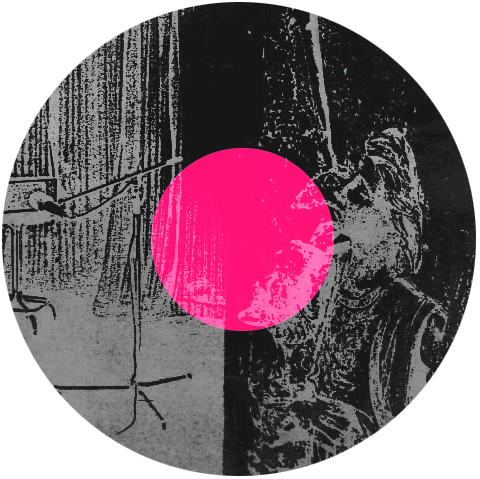Posts on: surplus
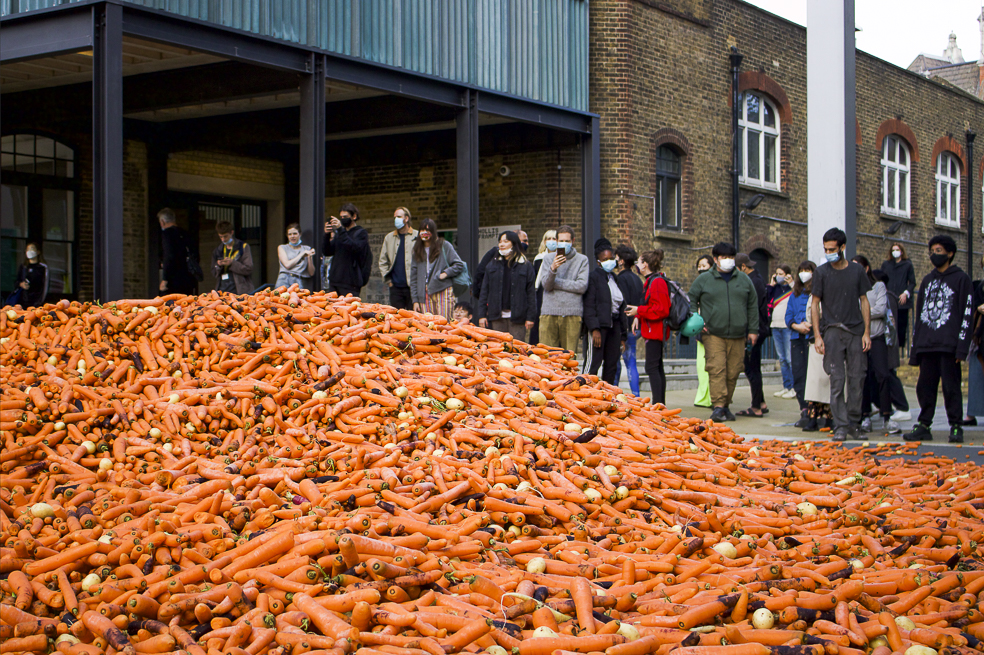
Activists and Artists
Let us begin by proposing that “the Left”, since its inception, has been divided into two main camps: a) the “bread and butter” up-the-workers Left of the trade union movement and various activist organisations, and b) the progressive counterculture or avant-garde located around the spheres of art, music, film, poetry and so on1. While both of these aggregates are united in adhering to some kind of anti-capitalist critique, each approach and enact their critique of capitalism in strikingly different ways and languages, varyingly leading to either 1) productive mutually reinforcing collaboration or 2) bitter hatred and resentment between the two camps. For shorthand, let us conceive of this as a split between the activists and the artists. (With all the usual caveats that such a shorthand is necessarily reductive - of course activists can also be artists, and artists can be activists, and many people actually are both those things.)
What is the nature of this split?
To start with the artists, we can first note that they primarily enact their critique aesthetically: their aim is oriented around the production of a singular Work or Event that ruptures common sense and forces us to drastically rethink our place in the universe, sometimes to such an extent that it initially offends all our pre-existing tastes and sensibilities. As indicated, this approach is driven by a logic of singularity, seeking to strike that uncanny moment that is simultaneously both absolutely unique and yet absolutely universal, a kind of return of the repressed that both horrifies and captivates us.
Consequently, while the artist is (usually) highly sympathetic to the critique of capitalism, they try and integrate such a critique into a broader, more universal frame. This often makes such a critique more muffled or abstract than, say, the activist would like: a film director may decide to critique capitalism’s ecological destruction by directing and writing a film that is heavily laden with ecological themes, without mentioning the words “capitalism” or “working class”, for example, at all in it. Nonetheless, in that the film presents us with a particular vision of Nature that capitalism works to obstruct, the artwork can be said to function as a critique of capitalism.
This is because the artist seeks to conjure and use a language that is poetic rather than direct and literal. The intention is not really to use language as a tool whose only function is to “point to” things in the exterior “real” world, but to treat language as a medium to be explored, stretched, cut up, etc, as a raw material with its own Truth. To borrow a point from Badiou, the artist seeks a Truth that is not propositional (i.e. does not take the form of a proposition which we then “prove”) but poetic. Or to put it in a Deleuzian register, artistic language follows a logic of expression rather than representation2. The artistic “language” of (a) painting, for instance, is not one that ultimately seeks to refer to an exterior ground – though it may, by happenstance, do that – but rather seeks to be a ground itself, to be a new Truth of its own.
In contrast to this aesthetic approach, the activists approach their critique politically, attempting to organise the working class into some kind of collective organisation (party, union, guerrilla, etc.) held together by a common vision. Unlike artistic production, this organising is driven not by a logic of singularity but commonality: the activist does not seek to “stand out” among fellow members of the working class, like a singular artwork, but rather endeavours to be a mediator between such workers3, helping them to see past their particular differences and become conscious of their shared subjugation. The activist is a far more deferential figure than the artist as a result: they become skilled in the arts of conversation and persuasion, learning to tease the worker out of themselves and into dialogue with their fellow workers. The activist is always keenly aware of this: it is not their voice that ultimately matters, but the subjugated members of the working class that they organise with.
Alongside this organising activity, a political programme emerges, which seeks to give concrete expression to this commonality, acting as a faithful cross-section of its members’ situations and interests. What quickly becomes clear when drafting this document, answering the questions “Who are we and what do we want?”, is that what the workers hold in common is not so much a set of positive qualities or attributes, but lacks: lack of control over their work from their boss, lack of ownership over their home, lack of money, lack of respect from the police, and so on. Dark, spectral and vaporous, it is these lacks that form the truly generic set that, initially, forms the basis for the activist political organisation.
Translated at the level of the programme, such lacks dialectically become the basis for demands: open antagonisms rather than simple negations. The activists name their enemy and hold them responsible for their oppression and exploitation: the boss, the landlord, the police, the media. Through such a translation, it becomes evident that the logic of commonality that structures the political organisation necessarily leads to it being openly particular in its membership and approach4. Deferential to its members and openly antagonistic, the organisation never claims to speak, or be for, everyone, and nor could it function this way. Consequently, unlike the artwork, the political organisation is particular and pragmatic, grounded in specific concrete situations that they seek to intervene in. And it cannot be otherwise: for, as the “frame” of a situation is widened outwards and outwards, both in space and in time so as to become less and less particular, it becomes increasingly difficult to make and sustain political judgements. After all, from the point of view of deep cosmic time, does it really matter all that much if you organise your fellow workers at the job you hate and want to quit? Is going to another miserable protest worth your time? The activist can never really answer these questions, which anyway do not concern them: they care about the here and now, the blood boiling in their veins. Seeking to distance oneself from the immediacies of the present is scorned, either as lazy or aloof – a bourgeois privilege.
The artists, however, famously thrive on such distanced territory. Artistic genres and aesthetics such as the Gothic, sci-fi, and cyberpunk (to give just a few limited examples) have much to say about such cosmological, theological, ecological, technological, and philosophical concerns: the relation of man and machine, evolution, science, consciousness, aliens, God, the natural vs. the artificial… The activists? Not so much. Such distanced, abstract topics appear to have little immediate use in building the organisation.
Now, it is worth stressing that neither of these modes are better or worse: they are simply different ways of responding to a shared situation, and both can (and indeed often do) work together very productively. Today, most musicians, artists, and writers are broadly left-wing and have great sympathy and admiration for the work of organisers, particularly in unions like UVW and IWGB (the former of which now has a branch for creative and design workers). Furthermore, some of the most visible union struggles in the UK and US recently have also been in the creative sector, such as workers at the Tate, National Theatre and Southbank Centre striking over job losses two months ago, or staff at both Pitchfork and Vice forming unions which have won recognition and new contracts, as well as doing work stoppages.
Simultaneously, however, such growing class consciousness among artists and creative workers does not seem to have been met with a growing “artistic” consciousness among activists on the Left. Indeed, for much of the contemporary “bread and butter” Left, the avant-garde is still something to be treated with suspicion: a pretentious, bourgeois plaything that is unnecessarily esoteric and detached from the everyday person’s life and concerns. And this is where the carrots come in.
-
Something I spoke about in the “Corbyn, Glamour and the Working-Class Dandy” post. ↩
-
The term “expression” may sound like vague nothing-speak, but Deleuze very rigorously theorises it, and its differences from signification/representation, in Expression in Philosophy: Spinoza. ↩
-
Clearly such organisations are not just made as workers – replace “workers” with “tenants”, “people of colour”, “queer people”, “women”, where appropriate, etc. ↩
-
The terminology is used precisely here: singular is not the same as particular. Whereas “singular” directs our attention to a certain absolute uniqueness, “particular” points us to the Whole that this particular thing is part of. When we talk about a “particular apple”, for instance, we are identifying this round, green object through the Whole (Apple-ness) that it is a part of. ↩
Messy, speculative dispatches from an alien encounter…
On a visit up to Scotland two weeks ago to see Nick, we, utterly accidentally, came across alien territory: territory all the more alien for being so absolutely earthly.



Vast Martian expanses of rusty red rock; the half-destroyed 14th century Tantallon Castle on the horizon; a small harbour filled with grubby, viscous sea foam; an eerily neat pile of slimy seaweed tentacles; a brooding, apocalyptic sky… It was all utterly unhomely, utterly untimely: simultaneously before and after the end of the world, in and out of time, on and off this planet.
We were lost for words, revelling in this place’s unanswerable secrets. This place was literally, not at all metaphorically, psychedelic.
Retroactively, we discovered this place was called Seacliff – but all accounts of it seem to domesticate it or make it cosy, effacing its eerie cosmic energy. It’s all compartmentalised and explained away: all tales of war games, private beaches and the wealthy families who own them, tourists and dogwalkers, the local crab fisherman who uses the harbour.
Nice try, but the rocks speak for themselves. Seacliff is far more weird, trippy and unsettling than any of these authorities could ever admit. The question remains though: why?
*
Maybe it’s all just sublimity. The sublime, as theorised by many philosophers including Kant and Burke, refers to a kind of objective, absolute magnitude that is of such a quantity that it overwhelms all our faculties of comprehension. Think of, say, the Grand Canyon, or the view of Earth from the Moon, or the waves continually crashing against overhanging cliffs: this is the sublime – a grand magnitude that leaves our mouths agape, lost for words (for such crude human inventions cannot possibly do it justice). As this demonstrates, the sublime lies beyond such sense-faculties – it is supersensible, a surplus or leftover that cannot be captured, explained, and operationalised.
The feeling of the sublime, however, doesn’t totally capture the affect evoked at Seacliff. Sublimity seems to suggest a kind of separation between the exorbitant, excessive sublime object and the limited subject-interior that is submitted to, and has to adapt to, it. But the feeling at Seacliff wasn’t exactly about some grand exterior object that we could merely gawk up at – instead, it was about a vast exteriority that was revealed to have been “in” us from the beginning. This was the unsettling – and psychedelic – thing about Seacliff and its cooled volcanic landscapes: rupturing through the surface-level tension of our everyday experiences, it seemed to expose some traumatic, repressed core that had been underlying them this whole time, without us noticing. The most internal became the most external…
Read More »
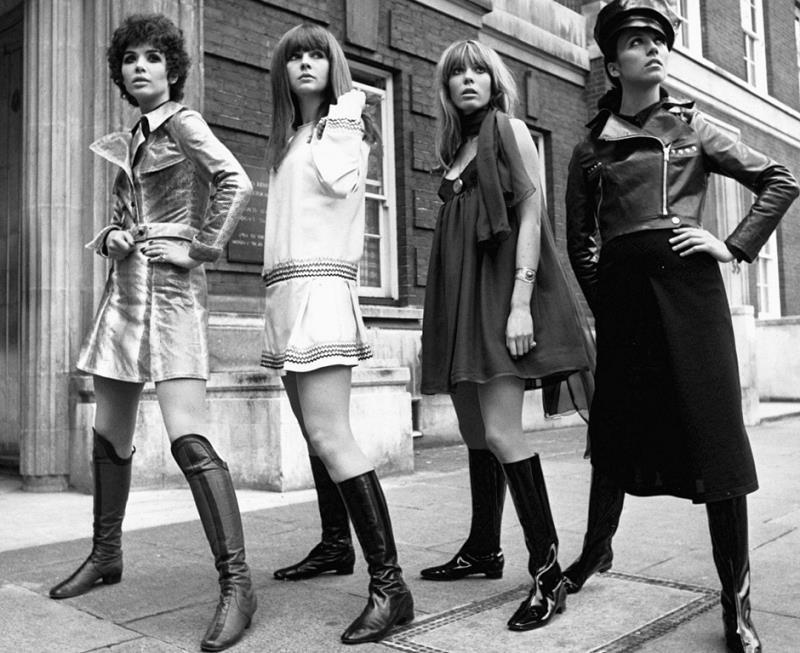
I have never fully understood why revolution is expected to be so drab. The dictatorship of the proletariat has so often been interpreted as the dictatorship of the ugly and shapeless that it begs the question why glamour is anathema to so many advocates of social upheaval? In all of recent revolutionary history the only truly glamorous revolutionaries I can remember - Che notwithstanding, who was handsome but also a scruffy bastard - were the drag queens of Stonewall in Greenwich Village who went toe-to-toe against the homophobia of the NYPD in 1969 and scored a major victory for gay rights and the crucial liberty of sartorial self-expression. Ever since, I have been with them all the way, a true believer in the legitimacy of fighting the good fight in high heels.
…the majority of the up-the-workers Left… seemed totally unaware of the great tradition of the English working class dandy. The wideboys of the Forties, …the teds of the Fifties and the mods of the Sixties were all progressive versions of what Orwell described as ‘young men trying to brighten their lives by looking like film stars’ and George Melly later called ‘revolt into style’. The workers never wanted to look like the proles of Metropolis but they were too wretchedly paid and brutally overworked to do otherwise… One of the great attractions of the Blackshirts was that they offered unemployed louts snappy uniforms. The lone Red of my acquaintance who had both an awareness of power through style and the flash that came with it was a self-proclaimed Stalinist who rode a Triumph Bonneville and favoured Jim Morrison-style leathers and a swan-off Levi jacket, with a hammer and sickle in place of the motorcycle club patch. More than once he told me, ‘I’d join the Hell’s Angels, but it’s the bastards you have to ride with. They don’t have a clue. I mean, how many could I discuss Frantz Fanon and The Wretched of the Earth with?’
– Mick Farren, Give The Anarchist a Cigarette
The above quote, found while trawling the archives of Owen Hatherley’s old blog, succinctly gets to one of the, in retrospect, key limitations of Corbynism (and, by consequence, Starmer’s Labour).
As I have argued previously, the initial promise of Corbyn, when he was first elected, was that he was not just a rejection of the neoliberal status quo at the level of policy, but also – crucially – the level of style and culture. In the early days of his premiership, Corbyn visibly and starkly stood out against the bland austerity-lite managerialists who ran the party at the time. He didn’t look like your boss, but an eccentric regular at an urban greasy spoon, doffing a fiddler cap and filled with secrets and anecdotes from the city’s grimy underworld. Cycling away into the distance, he had lived the life we wanted to live but had always been impeded from doing so by capital: he was one of us, in all our imperfections and rough edges. The difference between him and the grey vultures, circling around the already-ravaged carcass of New Labour, was palpable (as the painfully awkward picture below visualises).

The limitation of Corbyn’s “alternative” style, however, was that it was largely negative in character: it rejected the black suit and white shirt by forgetting the suit altogether and unbuttoning the shirt’s top button, rather than wearing something else entirely (a la Che or the Stonewall drag queens). Hence the frequent denigrations of Corbyn’s “scruffiness” – to be scruffy is always defined in relation to a dominant ideal which it fails to meet through a messy excess (long hair, unclean clothes, etc). The scruffy can be easily denigrated because it is not a style that stands on its own terms – it is only the failure of another, dominant, style.
Instead of continuing this negative trajectory through to its conclusion, however – which would have seen him doubling-down on his scruffiness and lack of “professionalism” in order to create a new, positive, alternative style – Corbyn caved to the neoliberal style council remarkably quickly. Beige suits were replaced by dark ones by the time the 2017 general election campaign came around, and such a stylistic capitulation was only further entrenched by Labour’s success at that election, which ostensibly dictated that the party must look like a “government and waiting” and Corbyn a “future Prime Minister”. Consequently, 2019 election Corbyn seemed to have lost all the spark and difference of 2017 Corbyn: years of “image management” and trying to out-government the government during the charade that was the Brexit withdrawal process had smoothed out all his edges, turning him into just another functioning component of the cynical electoral machine. (Something that unsurprisingly led to Corbynite Labour’s defeat – Corbyn was never elected or designed to be a functioning cog, but a spanner lodged in the mechanism, rupturing and destroying it. This was the role he could convincingly and persuasively play, not “future Prime Minister”.)
Read More »
The Fisher-Function has routed itself so thoroughly in my neural circuitry that I am no longer just echoing and citing k-punk (at an almost embarrassingly high frequency) but anticipating its thoughts accurately. Upon reading some posts on Nietzsche in an attempt to help me get some bearings on the notorious philosopher, I came across this passage from a 2006 post that spectacularly wires together Nietzsche and Celebrity Big Brother:
Read More »
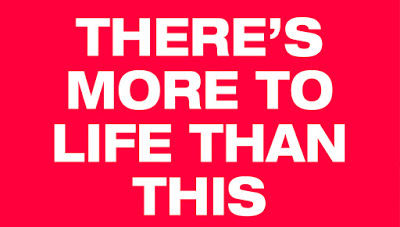
It’s been incredibly humbling over the past few weeks to see people value, share, and stick up the election posters I designed in a spur of the moment one evening, as pictured above. While I of course designed them to go viral, I never actually expected it to happen, let alone become the inspiration for a massive banner made by Manchester Momentum and cited in a recent VICE article by Lauren O’Neill. (I’m yet to get over my excessive self-criticism which deems every piece of work I complete, including this very post, as irrelevant, useless, and a waste of everyone’s time; I’m working on it.)
On an (im)personal level, the posters stemmed from a profound frustration and exhaustion I’ve been feeling over the past few months, as I have transitioned out of the fragile safe-haven of the university and fully into the world of work. Currently I work as a one-to-one teaching assistant in a primary school in South London, specifically supporting a child with global developmental delay, teaching them everyday how to read, write, do maths, and so on. Even though the working conditions of the job are better than many (including myself) have become accustomed to in a precarious economy (I have a contract, a salary, I get paid sick pay, free hot lunches, e.g.), the fact of the matter is that my rent takes up over half my income and I still more or less live paycheque to paycheque, making little savings. Beyond economics, too, the job is absolutely exhausting on a very deep emotional level, and takes significant time and energy away from my weeks that I would much rather prefer to spend doing the things I’m passionate about: writing, studying, creating, and campaigning.
But, as hinted towards above with the “(im)personal”, these struggles are anything but personal and individual. I know for a fact that other workers in the school share my malaise, as do workers in a whole host of sectors in the UK and across the world. “My” exhaustion, depression, anger, are anything but mine: instead they are the impersonal expressions and effects of capital as a virtual body that distributes labour and (re-)production in a specific kind of way. And if those feelings are impersonal, the working of some kind of social machine, then they immediately become a political issue, and the object of intervention for political propaganda and aesthetics. And given the fact there is currently a general election campaign ongoing, where the Labour Party (for all its massive faults and profound limitations) is standing on a programme that could drastically ameliorate these feelings of frustration and transfer power to the working-class in the UK, the posters were the natural outcome of this line of thinking.
kinda wanted to make some election propaganda that didn't take the form of "selling" a policy but more targeted those gut feelings of exasperation, anger, and depression that result from the relentless grind of living under this system every single fucking day pic.twitter.com/zlLfM4JaSO
— state sanctioned content account (@anarchoccruism) November 13, 2019
Demand More
After I posted them on Twitter, I noticed a shared theme among the posters that hadn’t even occurred to me while designing them. Namely, three out of four of posters invoked the notion of more. (Demand more from life; there’s more to life than this; do you really want more of the same?) What is this more? Why is it valuable? Why does it form a part of a radical working-class politics? What do we demand when we demand more? What do we mean when we say “there’s more to life than this”?
Swap out the word “more” for “surplus”, and the way forward here becomes a bit clearer (the concept of ‘surplus value’ is Marxism 101, for example). To have a surplus is to have more than necessary; to have a quantity of something that exceeds the amount needed for a particular task to be completed. A surplus is therefore always defined in relation to a certain task that needs to be completed; it derives its definition from a prior code or programme of use. It’s only possible to define, for example, an office of one hundred computers as having a surplus of computers if it doesn’t have a code of use that incorporates them. Hire more staff, work out things for them to do (a.k.a. incorporate them into a programme/code), and soon enough those computers will no longer constitute a surplus – they’ll just be what’s required to do the job.
Surpluses, therefore, don’t simply possess a quantitative character – they possess a qualitative one too. When a surplus exists, one escapes the logics of pure utility and functionalism and consequently finds themselves on much more open, and creative, terrain. Surpluses are that which escape a code, that a code cannot or does not incorporate, and therefore express what Deleuze and Guattari term in A Thousand Plateaus the “essential margin of decoding” inherent in any code:
The modern theory of mutations has clearly demonstrated that a code, which necessarily relates to a population, has an essential margin of decoding: not only does every code have supplements capable of free variation, but a single segment may be copied twice, the second copy left free for variation. […] Every code is affected by a margin of decoding due to these supplements and surplus values […] (ATP, 61)
In simpler terms, codes are non-exhaustive. Despite their ambitions, they never attain complete control over their inputs and outputs; an office computer may be intended for data entry, but it can also be used by the worker to browse social media and procrastinate at work, or to input false data in a bid to damage the company. The surplus is inescapable: you can block Facebook on work computers, fire trouble-makers, but you will never be able to stop people and things exceeding the code, detaching segments from it and linking them to other codes… there’s always an exit.
Qualitatively, therefore, surpluses express a freedom and openness that comes through an escape from the cold and literal functionalism of the code from which they are defined in relation to. This is the “joy” of surpluses, their ability to augment and increase our capacities to act (think of what you could do with an office full of one hundred computers free to be put to use!)
The “more” we demand thus reveals itself to be an intensive, not an extensive, quantity: an intensive quantity that, like temperature, cannot be increased or decreased without changing the very quality and character of the quantity. This sounds abstract but really is at work in many aspects of our everyday lives; it’s why genuinely free time feels so qualitatively different from time spent at work, for example. Work is boring, repetitive, and homogenous, as the capitalist machine tightly and rigidly organises our time according to a specific code of operation that we are mere cogs of, making labour-time a dull extensive quantity… genuinely free time, meanwhile, is relaxing, adventurous, exciting, heterogenous, intensive. (This is what is what we mean when we say we don’t want more of the same.)
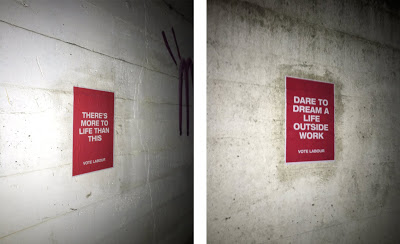
Some of the posters put up by a friend & comrade in a marginal constituency in Chesire.
The Politics of Surplus
It’s perhaps normal to treat surpluses as something exceptional and rare in life, a lucky moment of luxury or convenience that comes along once in a while. But really surpluses are everywhere – and this is where the politics of surpluses comes in. Georges Bataille famously argued in The Accursed Share that economics (and life more generally) in general is not structured around a lack, or scarcity (the so-called “basic economic problem” in mainstream economics), but rather a vast and interminable excess, originating from the superabundance of energy Earth continually receives from the Sun. And this excess is integral to the reproduction of life itself, for without surplus energy, a system/organism cannot grow or reproduce itself. In his words from volume 1:
I will begin with a basic fact: The living organism, in a situation determined by the play of energy on the surface of the globe, ordinarily receives more energy than is necessary for maintaining life; the excess energy (wealth) can be used for the growth of a system (e.g., an organism); if the system can no longer grow, or if the excess cannot be completely absorbed in its growth, it must necessarily be lost without profit; it must be spent, willingly or not, gloriously or catastrophically. (TAS, 21)
As Deleuze and Guattari chart in Chapter 3 of Anti-Oedipus, how surpluses have been produced, distributed and expended is central in determining how societies are organised historically (DGAO, 5). In what they term “savage” or “primitive” societies, for example, surpluses of specific goods are accumulated (such as cattle, yams, or cowry shells) according to local codes of value and significance. These surpluses are not hoarded but become the basis of ritual orgies of waste, expenditure and/or sacrifice (such as the North American potlatch) that are overloaded with meaning and symbolism (DGAO, 64).
Under capitalism, however, surpluses become reduced to mere quantities. Viewed from the inside of capital’s circuitry and operation, the surplus loses all its qualitative magic, symbolism, and freedom. Capital’s continual accumulation, self-expansion and displacement of its limits presupposes a universalisation and homogenisation, enacted through capital-money, which drags all production onto a continuous, divisible line on which all production can be directly compared, measured, and quantified. On this line, surplus can only be expressed and treated as (quantitative) profit, and all surpluses become comparable and equalised to one another (£50million in profits is always worth the same, whether it can from a restaurant chain or an oil company, despite the two qualitatively producing two very different things).
Simultaneously, and by corollary, the surplus’ relation to production and expenditure changes. No longer are surpluses produced to be expended, but instead to produce more surplus. Production is no longer subordinated to consumption/expenditure but to more production, the production enabled by the surplus. Viewed from within (not outside of[^1]) capital’s logic, surplus is no longer than which escapes a code but instead captured by and incorporated into the very axiomatics of capital itself. Indeed, capitalism depends on the decoding effectuated by surpluses and its generalisation throughout society, for it is this decoding that allows production to beget more production, that allows capitalism to always expand and produce more profit. (For a more elegant theoretical explication of this argument, see the “The Civilized Capitalist Machine” section of Anti-Oedipus.)
The correlate of this process is the (re)production of a stratified class structure. For the dragging of all labour/production onto the continuous line, making all labour directly comparable, requires as its condition a monopolistic appropriation: human activities only become capitalist labour when they are made appropriable from the point of view of a monopoly power that fixes in position the boss/bosses/owners of production (ATP, 513; see also the rest of the “Apparatus of Capture” plateau). Labour under capitalism always flows upwards to some one power which stockpiles it; you always labour for someone, your work is always being appropriated; and it is this stockpiling of labour by a monopoly power that enables labour to be directly compared in the first place.
Surpluses in capitalism are therefore not only reduced to quantities, but crucially depend on a monopolistic appropriation in order to be so. In other words, surpluses here only exist when there’s someone to appropriate them (and thus benefit from them). Capital’s “flattening” drive (drawing abstract equivalences between disparate processes of production) is therefore simultaneously matched by a hierarchising one, which institutes apparatuses of capture, control, appropriation and enforcement which are designed to catch, record, code and quantize surpluses so that they can become the basis of further capitalist (surplus-)production. Thus is born the stratified layers of production/labour that motor the capitalist machine, all predicated on the hierarchy worker/boss (which soon enough becomes worker/boss/boss’s boss/boss’s boss’s boss/… and so on). Capital depends on labour, on the working-class, in order to survive, but it does so reluctantly; its real heart is with the tight-arsed, joyless managers, bosses and accountants who make sure any surplus, excess or overflow is going in the most “productive” direction. For their loyal efforts, the boss’s boss then skims off the surplus produced by capturing these surpluses and rewards the boss handsomely with higher wages, more autonomy, better working conditions, promotions, and perks. And so it goes on, up the capitalist chain, surpluses everywhere, always immanently begetting more surpluses… except at the bottom, where the effaced fact of capital’s existence – quantitative surplus(-values) depend on acts of appropriation, capture, control, and perhaps violence in order to exist – lies plain to see, and be experienced. No surplus here, just the primary acts of monopolistic appropriation, control and exploitation that allow the surplus to surface and be captured qua quantitative surplus (profit). Just the barking demands to “get it done”, to do what’s necessary (nothing excessive or outside the normal boundaries, please), from the boss.
Thus emerges the austere quality of pure utility that pervades working-class life – doing what has be done to get by and little else – and the craving for a more that is almost never satisfied. That craving isn’t illusionary, it’s the real desire for the surplus, the escape from the code and the logic of pure utility, that always exists but is systematically blocked to the working-classes (and other oppressed groups) through capital’s working. To be working-class is to be reduced to pure functionality, to be simply operational, to execute orders, to be continuously told by the boss (and the boss inside your head) to simply get the job done. Just do it, get it done, it doesn’t matter why (because knowing or discussing why in any depth isn’t needed to execute the task).
The working-class are those who never or rarely get to experience or enjoy surplus; their only experiences of surplus they have are the traces of its extraction: exasperated sighs, exhausted slumps onto the sofa, evenings vegetating in front of a screen. To be exhausted is to have been extracted from; to have been appropriated and used by capital’s apparatus of capture. The working-class are maintained as an afterthought, a subtraction: “Labour and surplus labour are strictly the same thing […] Surplus labour is not that which exceeds labour; on the contrary, labour is that which is subtracted from surplus labour and presupposes it” (ATP, 514).
To declare “there’s more to life than this” under capitalism is thus to affirm the existence of excesses and surpluses (of value, of energy, of time) as the condition for life itself, and to recognise these surpluses’ qualitative, rather than simply quantitative, character. It is furthermore to recognise that this “more” is not simply some vague hypothetical, but something real and actively blocked to most people under capitalism’s machinations. Above all else it is a demand to ride the decoded flows set in motion by the qualitative surplus in ways that cannot – initially – be apprehended by the capitalist machine, and thereby expose its limits. What would happen if every member of the global working-class were to enjoy the same enjoyment of surpluses, excesses and (perhaps) luxury, both quantitatively and qualitatively, that bourgeois managers and bosses currently do on a regular basis? If everyone was always able to experience the qualitative “more” that so plainly characterises life and reproduction? Capitalism could not accommodate such a system; that’s why we always push further, ride the decoded flows into something beyond capital, demand more.
Notes
[^1] : It’s important to stress the “not outside of” here, otherwise there may appear to be a contradiction with the argument made a few paragraphs above. Surpluses don’t just completely become quantitative and incorporated into capital with the onset of capitalism; such an argument is ridiculous. But viewed from “within” capital, from the viewpoint of capital and the figure of the capitalist, surpluses do appear, and are treated as, quantitative (more production = more money), and this is the point made here.
References
ATP = Gilles Deleuze and Felix Guattari, A Thousand Plateaus. Translated by Brian Massumi. 2013. Bloomsbury: London.
AO = Gilles Deleuze and Felix Guattari, Anti-Oedipus. 1983. University of Minnesota Press: Minneapolis.
TAS = Georges Bataille, The Accursed Share, Volume 1: Consumption. 1988. Zone Books: New York.
DGAO = Eugene W. Holland, Deleuze and Guattari’s Anti-Oedipus: Introduction to Schizoanalysis. 1999. Routledge: London.
Read More »